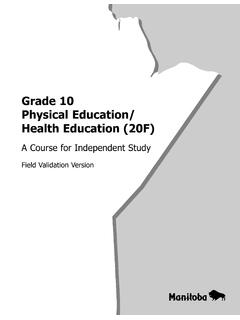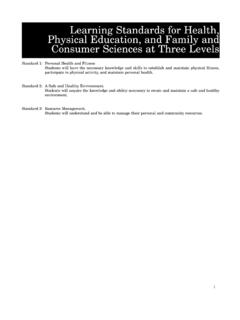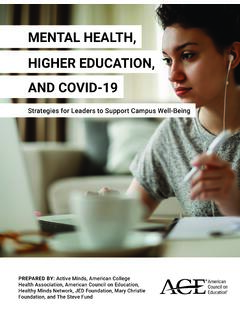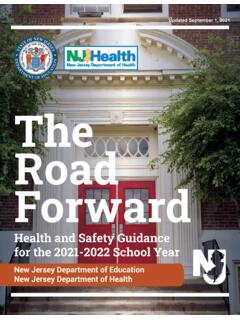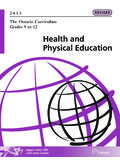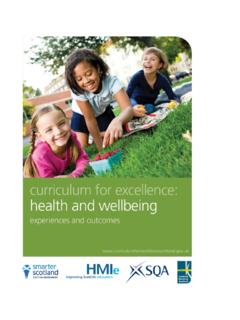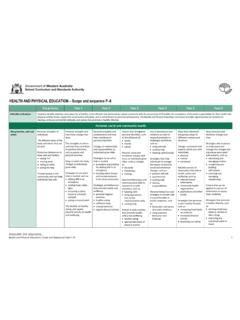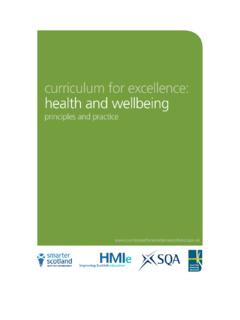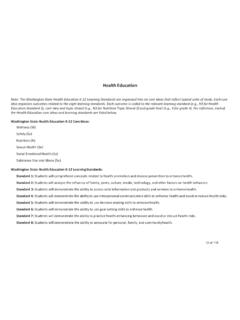Transcription of Relationships Education, Relationships and Sex Education ...
1 Relationships Education , Relationships and Sex Education (RSE). and health Education Statutory guidance for governing bodies, proprietors, head teachers, principals, senior leadership teams, teachers Content Secretary of State Foreword 4. Summary 6. What is the status of this guidance ? 6. About this guidance 6. Who this guidance is for 6. What this guidance updates 7. Introduction 8. Summary of requirements 10. Developing a policy 11. What is required? 11. Religion and belief, including teaching in schools with a religious character 12. Use of materials 13. Equality 13. Pupils with special educational needs and disabilities (SEND) 15.
2 Lesbian, Gay, Bisexual and Transgender (LGBT) 15. Governors 16. Working with parents/carers and the wider community 17. Right to be excused from sex Education (commonly referred to as the right to withdraw) 17. Working with external agencies 18. Relationships Education (Primary) 19. By the end of primary school: 20. Managing difficult questions 23. Sex Education (Primary) 23. Relationships and Sex Education (RSE): Secondary 25. By the end of secondary school: 27. The Law 30. Physical health and mental wellbeing 31. Menstruation 31. Physical health and mental wellbeing: Primary 32. Physical health and mental wellbeing: Secondary 35.
3 2. Delivery and teaching strategies 39. National curriculum subjects: citizenship, science, computing and PE 39. Pupil Referral Units/Alternative Provision 40. Senior leadership and whole school approach 40. Flexibility 41. Safeguarding, reports of abuse and confidentiality 42. Assessment 43. Accountability 44. Annex A Regulations 45. Annex B Suggested resources 46. Annex C Cross-government strategies 49. 3. Secretary of State Foreword Today's children and young people are growing up in an increasingly complex world and living their lives seamlessly on and offline. This presents many positive and exciting opportunities, but also challenges and risks.
4 In this environment, children and young people need to know how to be safe and healthy, and how to manage their academic, personal and social lives in a positive way. This is why we have made Relationships Education compulsory in all primary schools in England and Relationships and Sex Education compulsory in all secondary schools, as well as making health Education compulsory in all state-funded schools. The key decisions on these subjects have been informed by a thorough engagement process, including a public call for evidence that received over 23,000 responses from parents, young people, schools and experts and a public consultation where over 40,000 people contacted the Department for Education .
5 The depth and breadth of views is clear, and there are understandable and legitimate areas of contention. Our guiding principles have been that all of the compulsory subject content must be age appropriate and developmentally appropriate. It must be taught sensitively and inclusively, with respect to the backgrounds and beliefs of pupils and parents while always with the aim of providing pupils with the knowledge they need of the law. We are clear that parents and carers are the prime educators for children on many of these matters. Schools complement and reinforce this role and have told us that they see building on what pupils learn at home as an important part of delivering a good Education .
6 We agree with this principle and congratulate the many schools delivering outstanding provision to support the personal development and pastoral needs of their pupils. We are determined that the subjects must be deliverable and give schools flexibility to shape their curriculum according to the needs of their pupils and communities. In primary schools, we want the subjects to put in place the key building blocks of healthy, respectful Relationships , focusing on family and friendships, in all contexts, including online. This will sit alongside the essential understanding of how to be healthy. At secondary, teaching will build on the knowledge acquired at primary and develop further pupils' understanding of health , with an increased focus on risk areas such as drugs and alcohol, as well as introducing knowledge about intimate Relationships and sex.
7 Teaching about mental wellbeing is central to these subjects, especially as a priority for parents is their children's happiness. We know that children and young people are increasingly experiencing challenges, and that young people are at particular risk of feeling lonely. The new subject content will give them the knowledge and capability to take care of themselves and receive support if problems arise. 4. All of this content should support the wider work of schools in helping to foster pupil wellbeing and develop resilience and character that we know are fundamental to pupils being happy, successful and productive members of society.
8 Central to this is pupils'. ability to believe that they can achieve goals, both academic and personal; to stick to tasks that will help them achieve those goals, even when the reward may be distant or uncertain; and to recover from knocks and challenging periods in their lives. This should be complemented by development of personal attributes including kindness, integrity, generosity, and honesty. We have endeavoured to ensure the content is proportionate and deliverable. Whilst we are not mandating content on financial Education or careers, we want to support the high quality teaching of these areas in all schools as part of a comprehensive programme, which complements the national curriculum where appropriate and meets the ambitions of the Careers Strategy.
9 We know that many schools will choose to teach the compulsory content within a wider programme of Personal, Social, health and Economic Education or similar. Schools are encouraged to continue to do so, if this is right for them, and build on established, high quality programmes. These subjects represent a huge opportunity to help our children and young people develop. The knowledge and attributes gained will support their own, and others', wellbeing and attainment and help young people to become successful and happy adults who make a meaningful contribution to society. 5. Summary What is the status of this guidance ?
10 This is statutory guidance from the Department for Education issued under Section 80A. of the Education Act 2002 and section 403 of the Education Act 1996 further details are in Annex A. Schools 1 must have regard to the guidance , and where they depart from those parts of the guidance which state that they should (or should not) do something they will need to have good reasons for doing so. About this guidance This document contains information on what schools should do and sets out the legal duties with which schools must comply when teaching Relationships Education , Relationships and Sex Education (RSE) and health Education .










